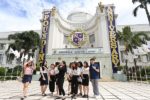Cebu in good spot as ESL market booms

Students from Busan, South Korea tour the Capitol on Aug. 21, which is part of their four-day internship program and part of the activities of the sisterhood ties between Busan and Cebu province. Cebu is also preparing for more Koreans, students like these Capitol visitors, to spend time here to learn English as Second Language especially with the Tourism department’s new thrust to attract Koreans to this market.
CDN PHOTO/JUNJIE MENDOZA
MORE KOREANS WOOED
Cebu is seen to be in a good spot as the Department of Tourism (DOT) seeks to attract more Koreans to come to the Philippines to get their English as Second Language (ESL) training.
Alice Queblatin, president of the Cebu Association of Tour Operation Specialists (Catos), said the presence of direct flights from Korea to Cebu is one major advantage for the island province.
“There are also more facilities like schools, restaurants, and places for leisure activities that enhance the English-speaking environment for their language practice,” she said in a text message to Cebu Daily News.
Furthermore, she pointed out the availability of good English teachers in Cebu as well as better and more options for accommodation for Korean students.
In line with its ESL program, the DOT Korea Office recently hosted over 100 Korean students and their parents at the Philippine Study Abroad Fair at the Samsung Textile Center in Seoul.
In demand program
Tourism Secretary Wanda Corazon Teo, in a statement, said Philippine ESL is one of the most in-demand programs worldwide catering to Chinese, Taiwanese, Japanese, and Koreans alike, considering the country’s positioning as the world’s third largest English-speaking nation.
“It is very encouraging to see that more and more Koreans, Japanese, Chinese and Taiwanese, among other foreign students, are considering the Philippines over other English-speaking nations for their studies,” Teo said.
Choice destination
The DOT chief added that with a booming tourism industry and improving economy, it is no surprise that the Philippines has become one of the choice destinations of foreigners for high-quality and affordable education as well as for fun vacations.
Now on its ninth year, the activity, which is in partnership with www.pilja.com, featured 15 of the leading ESL institutions in Cebu, Baguio and Iloilo to talk about their programs and admission processes.
Go-to event
The Philippine Study Abroad Fair has become the “go-to” event for Koreans planning to take up ESL in the Philippines. In addition to promoting tourism, the gathering also aims to help students and their parents understand the Philippine ESL system.
“Hopefully, this will also help keep our best teachers here, closer to their family and friends,” Teo said.
Establish ties
Queblatin, for her part, said local stakeholders can take advantage of the thriving ESL market in the Philippines as well as in Cebu.
“Tour operators can establish ties with schools in Korea and offer services to support this market such as cultural tours for community interactions, affordable weekend staycation packages for leisure, as well as travel facilitation,” she said.
South Korea accounted for almost one-fourth of the Philippines’ total visitor arrivals with 1.475 million tourists coming here in 2016, 10.11 percent higher than the 1.3 million that came some two years ago.
For the first half of the year, the Korean market sustained its spot as the country’s top source of inbound traffic with 795,085 arrivals, representing 23.68 percent of the total market share.
Meanwhile, South Korea made up almost half of Cebu’s total number of visitors in 2016 with a 47.85 percent share or 791,777 tourists in 2016. This reflected a 17.03-percent increase from figures in 2015 at 676,570.
Japanese students
Aside from Koreans, ESL courses in Cebu are also very popular to Japanese students and professionals. Singapore is the Philippines’ closest competitor in ESL.
According to ICEF Monitor, a dedicated market intelligence resource for the international education industry, English language courses lasting several weeks including accommodation and meals usually cost between $800 and $1,600 in Asia, less than half the cost of similar programs in the US or Europe.
Disclaimer: The comments uploaded on this site do not necessarily represent or reflect the views of management and owner of Cebudailynews. We reserve the right to exclude comments that we deem to be inconsistent with our editorial standards.




